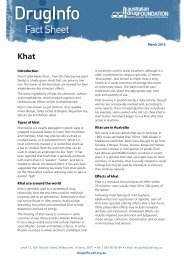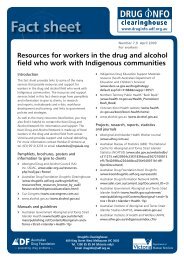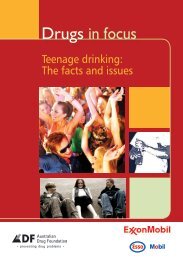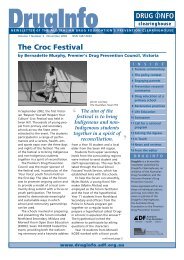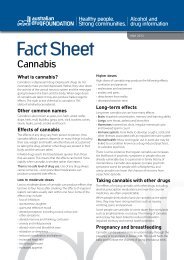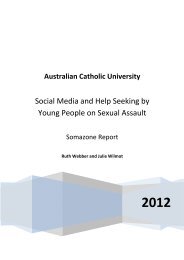Full report [PDF: 831KB](new window) - DrugInfo - Australian Drug ...
Full report [PDF: 831KB](new window) - DrugInfo - Australian Drug ...
Full report [PDF: 831KB](new window) - DrugInfo - Australian Drug ...
Create successful ePaper yourself
Turn your PDF publications into a flip-book with our unique Google optimized e-Paper software.
Social marketing<br />
Strategies<br />
Community information<br />
<strong>Drug</strong> Action Week activities<br />
School based education<br />
programs<br />
Parent education<br />
Comment<br />
Community information campaigns are often centrally funded and coordinated.<br />
To be effective in rural areas media campaigns need to be backed up with locally available<br />
material, internet based information or other innovations, such as SMS promotions via<br />
mobile phones.<br />
Consideration should be given to using images and depictions familiar to rural people and<br />
focussing on issues and solutions relevant to rural communities, for example, designated<br />
driver promotions.<br />
<strong>Drug</strong> Action Week is an initiative of the Alcohol and other <strong>Drug</strong>s Council of Australia, to raise<br />
awareness about alcohol and other drug issues.<br />
Information is able to be shaped and driven by local groups working on <strong>Drug</strong> Action Week<br />
activities and is often presented in engaging and novel ways. For example, the <strong>Drug</strong> Action Week<br />
website (www.drugactionweek.org.au) describes:<br />
“A play titled ‘Toxic’ was performed at schools in the Mitchell Community Health Services<br />
District, Victoria, to entertain students and share some important messages”.<br />
‘‘‘Within Reach’ was an art exhibition in which young people involved with alcohol and other<br />
drug services in Victoria created art works in a variety of media on the theme of drug use and<br />
other social issues” .<br />
Schools provide a convenient and effective setting in which to provide information and<br />
create a sense of social connectedness and resilience that can help to reduce the likelihood of<br />
consumption of alcohol at risky levels among young people.<br />
Available evidence suggests that school based drug education is more likely to be effective when<br />
a broad multilayered approach is used.<br />
The Victorian Department of Education has useful resources and information on its website including<br />
information and case studies on School Community Approaches to <strong>Drug</strong> Education (SCADE) projects<br />
(www.education.vic.gov.au/studentlearning/programs/drugeducation/funding.htm).<br />
The <strong>Australian</strong> Government Department of Education, Science and Training developed<br />
Principles for School <strong>Drug</strong> Education (Meyer & Cahill 2004) which contains 12 principles that<br />
are recommended to underpin drug education programs in schools. This document and other<br />
resources are available at www.redi.gov.au.<br />
Parent education can often go hand in hand with school based education programs so<br />
that messages are reinforced and consistent. Separate parent forums can help to clarify<br />
key information.<br />
Resources available at www.redi.gov.au include parent focused materials. More information can<br />
also be accessed at the Victorian Department of Education website (www.education.vic.gov.au/<br />
studentlearning/programs/drugeducation/funding.htm).<br />
Workplace education and<br />
promotion<br />
The use of alcohol can have a significant impact on workplaces in terms of accidents, lost<br />
productivity and absenteeism. Work related factors such as stress may influence the way people<br />
use alcohol. Workplaces therefore are a key setting for tackling alcohol.<br />
Taking an occupational health and safety perspective provides a practical motivation for<br />
employers and employees to embrace workplace education concerning alcohol harms.<br />
Examples of workplace strategies include training programs to raise awareness of alcohol issues<br />
developed by industry bodies and health agencies (see the case study on page 14) and Employee<br />
Assistance Programs provided within particular businesses or organisations that provide services,<br />
including alcohol and drug counselling.<br />
10 Prevention of harm from alcohol consumption in rural and remote communities


 - DrugInfo - Australian Drug ...](https://img.yumpu.com/30654388/14/500x640/full-report-pdf-831kbnew-window-druginfo-australian-drug-.jpg)
